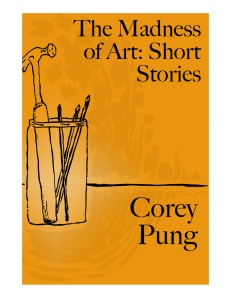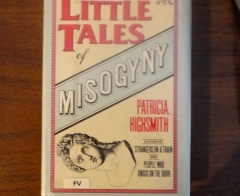 |
| Patricia Highsmith |
The Title Says It All: Little Tales of Misogyny by Patricia Highsmith
The title of the book, Little Tales of Misogyny, while glib, is hardly meant to be ironic or misleading. Rather, the title tells you exactly what you’ll be getting from Patricia Highsmith this time around. A more bluntly literal title could not be wished for.
The book really does contain little tales of misogyny–14 such tales in fact, most of which range between 3 and 5 pages each. Furthermore, each does contain some instance of misogyny, but if you’re hoping to find a condensed version of stories you’d watch on the Lifetime network, look somewhere else (I think Nicholas Sparks writes those, for example).
Little Tales of Misogyny is a darkly and mordantly funny book–when it’s not churning your stomach. I should also add it’s morbid and contains the most extreme version of gallows humor since the conclusion of Dr. Strangelove. One story features a young man asking a girl’s father for her hand, and he gives it to him, severed and in a box; if you think I’m giving away the ending, I’m not–that happens in the first paragraph.
Each story follows a simple formula: the heroine is introduced usually in the first paragraph, then her lover saunters in, and finally, through some quirk in his or her personality, tragedy is arrived at, although the climaxes often resemble punchlines to such a degree that you might find yourself laughing at the horror of it all (such as the delightfully wicked ending to Edith Wharton’s Ethan Fromme, a writer I’m sure Patricia Highsmith had some reverence for).
Patricia Highsmith is the underappreciated master of psychological crime fiction. As testament to that, read her classic stories The Talented Mr. Ripley or Strangers on A Train, both of which were made into popular films (the latter being filmed by Alfred Hitchcock and starred the late-great Farley Granger). One thing that distinguishes Patricia Highsmith from a bevy of other mystery writers is her obsession with the crime itself, and her apparent disregard for justice. If a character is caught or penalized, the act comes as an afterthought as if it were simply thrown in to satisfy her austere critics. In Little Tales of Misogyny, even the tacked-on justice is largely absent.
What we have instead are stories written with great precision and an utter lack of sentimentality, often leading the reader to be pulverized by the final ironies in each tale. All the while, Patricia Highsmith remains almost cruelly detached, writing wonderfully bleak descriptions like:
“There are lots of girls like Mildred, homeless, yet never without a roof–most of the time the ceiling of a hotel room, sometimes that of a bachelor’s digs, of a yacht’s cabin if they’re lucky, a tent, or a caravan. Such girls are bed-objects, the kind of thing one acquires like a hot water bottle, a traveling iron, an electric shoe-shiner, any little luxury of life.”
OR
“She was a bit hairy, one front tooth missing, but her sex appeal was apparent at a distance of two hundred yards or more, like an odour, which perhaps it was.”
Even the titles are unkempt or bloody, such as “The Mobile-Bed Object,” or “The Fully Licensed Whore, or, The Wife.”
Occasionally, Little Tales of Misogyny offers visceral moments as well, such as in the suspenseful story The Dancer, about a dancing duo whose act revolves around the man pretending to strangle the woman, only to gracefully free her in the end, after the catharsis is complete. When he discovers she has had affairs, he alters their routine, and the story ends with the line (spoiler)
“He had strangled her, too tightly for her to cry out. Rodolphe walked off the little stage, and left Claudette for other people to pick up.”
However, when it comes to this novel, I have to do something I am normally

cardinally opposed to, and that is, to judge an artist against themselves. True, Little Tales of Misogyny is better than A LOT of the crime fiction out there, and in many ways the book is truly unique, yet after reading work such as The Talented Mr. Ripley and some of her longer short stories, I have to say I kept thinking in the back of my mind as I read this that Patricia Highsmith could do better. She had done better. In her case, she set the bar high, and no one could reach it, herself included.
What was your opinion of Little Tales of Misogyny by Patricia Highsmith?




No comments:
Post a Comment